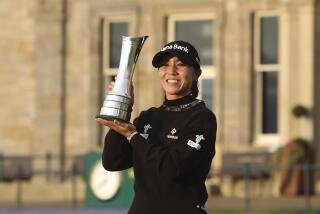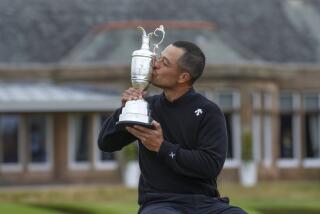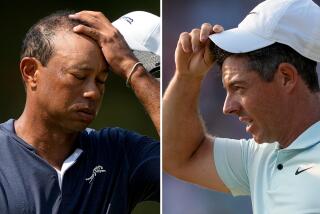Curses! It’s Another British Open Champion
A terrible thing happened to Justin Leonard Sunday. He won the British Open.
Here’s a young man who’s good to his mother, polite to his elders, keeps the Commandments, takes his hat off in elevators and takes the spoon out when he drinks coffee. He doesn’t deserve bad luck like that.
Oh, in a way, he couldn’t help it. That Swede behind him, Jesper Parnevik, was making bloody sure he didn’t win the damn thing. Hit the ball all over the place to make sure of it.
But poor Justin was snake bit. Kept making those unconscious birdies. All of a sudden, they’re giving him this hoodoo claret jug.
He should have refused it. Signed an incorrect scorecard. Done like the rest of us, put down an incorrect score. Only, we put down a “5” where we made a “7.” He should have put down a “7” where he made a “5.”
Oh, on the face of it, you would say he did a good thing. I mean, he made $418,875. He probably made as much as IBM last week. Trouble is, at what cost?
The British Open is like the Hope Diamond. Big, gaudy, shiny, beautiful. And deadly. You’re better off invading King Tut’s tomb.
Come with me to the year 1981. There was this gorgeous young golfer Bill Rogers with a picture swing, a putting stroke of pure silk. He was 29, and had the looks and build of a male model. When he came to Royal St. George’s that year, he had already won two tournaments, had been a member of the Walker Cup team and had won the collegiate championship.
He won the British Open by four shots over Bernhard Langer, beat the flower of the world’s golfers with a nifty 276. He was to be named “player of the year” by the PGA. The future looked unlimited.
Know how many tournaments Bill Rogers won since that glorious year when he won the British Open and was player of the year? One. Uno. Ein. The 1983 USF&G; Classic.
He earned $315,411 in 1981. He dropped off to $34,746 three years later, going from fifth on the money list to 134th. By 1988, he was down to $5,482. In 1989 and 1990, he earned no dollars at all. Zilch. He dropped off the tour, out of tournament play in what should have been his prime earning years.
Come with me now to the 1991 British Open. What do we have here? The elegant Aussie, Ian Baker-Finch, who blessed the great game with its first high-flying hyphen. Splendid game, splendid shot-maker. Won only one tournament on the American tour but his record was full of New Zealand Opens, Australian Opens, New South Wales Opens and so on.
Pretty soon it was filled with a British Open. Pulled up at Royal Birkdale with a 272, at the time the fourth-lowest winning score in British Open history. On top of the world, right?
And where is Baker-Finch today? Well, if you were paying attention, you may have noticed he shot a nifty little 92 in the opening round at Troon last week. Then, picked up, put the ball in his pocket and headed for the parking lot. Even as you and I when we can barely break a hundred.
Baker-Finch played the PGA Tour in 1995 and 1996 and didn’t make a cut. He missed 29 cuts, didn’t make a penny in those years.
Wait, there’s more! You know who won the British Open in ‘95? That’s right. John Daly.
I rest my case.
What happened to those guys? Is it a riddle for Sir Arthur Conan Doyle? Should Sherlock get on the case?
Well, one thing happens I will call “majoritis. “ It is simply this: A guy won a major 40 years ago and the guy put the cup in the trophy case and went out and teed it up in the next week’s tournament.
Now, you get in the lovesick embrace of Corporate America when you win a major. You get corporate “outings” where you play customer golf with a lot of guys with a “Call Me Joe” button pinned on their lapels and you lecture on the arts and mysteries of “shaping” shots, whatever that means.
Your game atrophies, your competitive fires are banked, you suddenly don’t have to putt for a living any more. You are, God help you, a celebrity.
How else do you explain the mysterious disappearance of swings good enough to win British Opens in the first place? The old-timers never had to let their fine tuning go by the boards while they chased the easy buck. Hogan teed it up in 292 tournaments --and finished in the top 10 in 241 of them. They didn’t have “corporate outings” to atrophy his game in those days. He had to keep playing--or go back to cleaning members’ club.
It’s not only the British Open. Curtis Strange won the U.S. Open in 1988 and 1989. He hasn’t won a tournament since. Payne Stewart won the 1991 Open. He had won seven tournaments before that. He has won only once since.
But it’s the British Open that’s the real haunted house. I mean, Greg Norman won it in 1993. Would you want to happen to you what has happened to him on a golf course since?
On balance, Tiger Woods probably got a lucky break. He made the mistake of tying the course record of 64 in the third round. But shooting 74 the last round was a stroke of genius. Like Parnevik, he might have dodged a bullet.
Winning the British Open is the historical equivalent of being sent to the Tower of London. Or being one of Henry the Eighth’s wives. The emblem shouldn’t be a claret jug. It should be a silvered hangman’s noose.
Look at it this way: If Tiger had won it, he’d probably be teeing up in a $10 Nassau three years from now with Bill Rogers and Ian Baker-Finch. With automatic presses on the back nine. As it is, maybe Justin Leonard may be joining them instead.
More to Read
Go beyond the scoreboard
Get the latest on L.A.'s teams in the daily Sports Report newsletter.
You may occasionally receive promotional content from the Los Angeles Times.










